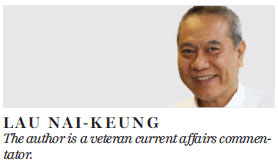What really happened to HK's quality of life?
Updated: 2015-10-22 07:28
By Lau Nai-keung(HK Edition)
|
|||||||
The Centre for Quality of Life at the Chinese University of Hong Kong (CUHK) has just released the CUHK Hong Kong Quality of Life Index 2014. Compared with 2013, the overall Index score of 2014 has declined slightly. The economic sub-index has decreased for the 10th consecutive year; the social and health sub-indices have also dropped.
In 2014, 11 out of the 23 indicators worsened. The drop of the "freedom of speech" indicator was particularly noticeable with an 18.63 percent plunge, the lowest since the index was launched.
This finding, backed by a supposedly solid quantitative survey methodology, falls neatly into the "white terror" discourse in Hong Kong. According to the dissidents and their sympathizers, our treasured freedom of the press and speech are being eroded by pressure from the north. Anecdotes, rumors and conspiracy theories abound. The assault on a journalist and withdrawal of advertising budgets, for example, were all cited as proof that our press is increasingly being censored.

The findings of Quality of Life Index 2014 suggest some really bad things, but what exactly does the drop in the "freedom of speech" indicator mean? While the Centre for Quality of Life's press release fails to provide any insights, we can find clues elsewhere. According to Sociology Professor Ting Kwok-fai, who is also a member of the Centre for Quality of Life, "Some survey respondents said they felt uncomfortable with expressing their views on issues such as 'Occupy Central'."
Given the sensitivity of the subject, and its implications for our social cohesion, Ting should have elaborated more on the views respondents are not comfortable expressing. Some comments only invite antagonistic interpretations and disputes which further lower our city's quality of life.
We all remember very well how, during and after the illegal "Occupy" movement, supporters of it advocated "unfriending" opponents on Facebook. Although some opponents of "Occupy" also got quite emotional, it was generally felt that the supporters - known also as the "yellow ribbons" - were a lot less tolerant. After all, it was the "yellow ribbons" who booed at guests of honor during university graduation ceremonies, spoiling an otherwise joyful occasion.
Since September last year when the "Occupy" protests officially began, a help hotline jointly set up by the Hong Kong Psychological Society and the Hong Kong Red Cross has been receiving quite a lot of calls relating to the protests.
According to a psychiatrist working with the society, many calls came from people who feared the protests might lead to chaos; others sought help on how to handle relations with people who have different views.
Some callers even insisted on first knowing the political views of the volunteer worker receiving their calls; when they learned that their views were different, they would immediately hang up, the psychiatrist said.
Because of the emotional toll that the "Occupy" movement took on society, the psychiatrist advised people affected by it to try to watch less news or even stop watching news reports on it. The psychiatrist also suggested that they avoid talking about politics with friends and family members if they felt the subject might affect their relationships.
We usually think of freedom of speech vis--vis the authorities, but social censorship is often also an important (if not more important) factor preventing us from expressing what we genuinely believe in.
When we talk about the city's quality of life, we must address the elephant in the room. Having effectively ripped society apart, the "Occupy" movement has proved to be the most divisive event in recent Hong Kong history. Rather than sowing the seeds of love or creating peace, as the movement's advocates claimed, the campaign bred hostility and even hatred among those involved. It also did this among family members, lovers, friends and colleagues, as evidenced by many media reports on runaway children, estranged lovers and broken friendships.
If we want better quality of life in Hong Kong, we must advocate moderation, tolerance, respect and compromise. These slogans may not be sexy, but they will deliver results.
(HK Edition 10/22/2015 page8)